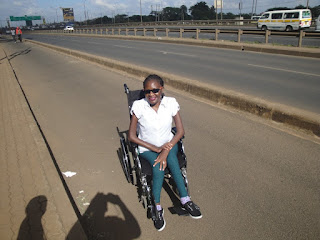Disability, Culture, Marriage And Gender Relations: Rite Of Marriage
According
to many traditional African beliefs and practices, the
Rite of Marriage
is
the third major initiation rite and it represents not only the
joining of two families, but also the joining of the two missions of
the new couple. In other words, the marriage rites are performed for
not only the coming together of male and females to procreate and
perpetuate life and the coming together of families, it is also an
institution that helps both the husband and wife to best fulfill
their mission and objectives in life. The transfer of stigma to those
associated with a stigmatized individual, labeled, ‘courtesy
stigma’ is most often found to affect the spouses of disabled women
who have been able to stay in marriage. Threats from the villagers
are seen to be too hard to bear. A disabled woman whose husband
decided to stay with her regardless of her disability confessed that
her husband faced more pressure like he was also disabled.
“...Then
the villagers faced my husband, they said “Your wife is
disabled, so what will you do either you kick her out or you have to
leave this village. That time my husband requested me to accompany
him to Nairobi otherwise we would be in trouble, so my husband was
also afraid about it...”
In
some cultures, Bride wealth, a gift to the bride’s family before
the first wedding ceremony, was discussed by two participants; both
felt that generally, disabled women should not expect any bride
wealth. This was so due to the belief that a disabled woman should
count herself lucky if she gets a man and in most cases the man would
be an old widower or one who was considered an outcast and unable to
get a wife. A female respondent said that if a woman is disabled then
a larger dowry will be requested for her marriage with her family
claiming that they have really worked hard to raise her into a woman
so they needed compensation for their efforts. In some cultures we
find that the woman's family is the one expected to pay the dowry, in
such cases, families that accept a disabled woman into their family
expect compensation for doing so, either through larger dowries from
disabled woman's family.

Comments
Post a Comment